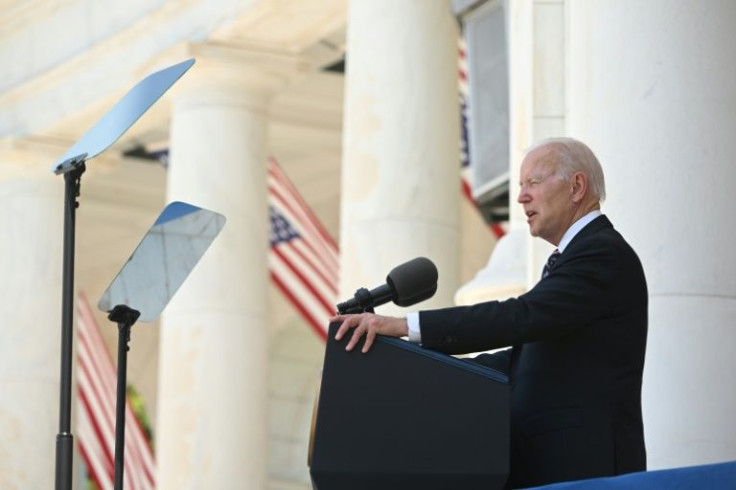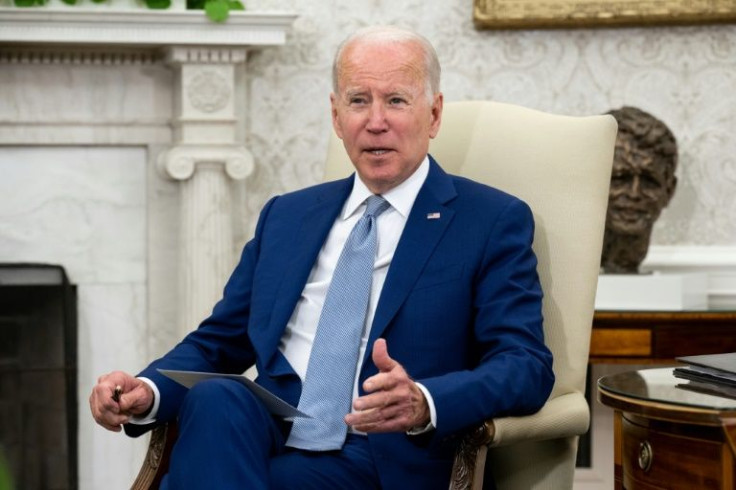Biden, Fed Chair Discuss US Inflation At White House
President Joe Biden held a rare White House meeting with the head of the Federal Reserve, Jerome Powell, on Tuesday to discuss soaring inflation and White House attempts to tame the politically damaging price surge ahead of midterm elections.
"I am meeting today to discuss my top priority: that is addressing inflation in order to transition from historic recovery to a steady growth," Biden said.
Also joined in the Oval Office by Treasury Secretary Janet Yellen, Biden stressed to reporters that while the Fed has a "laser focus" on inflation, he does not intend to infringe on the central bank's traditional independence.
"It starts with a simple proposition: respect the Fed, respect the Fed's independence," he said.
The White House said that the first Biden-Powell meeting this year would focus on inflation but in general "discuss the state of the American and global economy."
This is Biden's "top economic priority," the White House said, "as we transition... to stable, steady growth that works for working families."

Inflation of more than eight percent is casting a heavy shadow on Biden's claims to be steering the US economy to health after the Covid-19-induced crash.
Employment is back near pre-pandemic levels and growth is strong, but savage price increases for essentials including food and fuel are driving growing public dissatisfaction.
The Fed has raised rates three quarters of a percentage point, kicking off what central bank officials say could be a series of hikes aimed at calming down the economy, although there are fears that the unintended result may be recession.
Federal Reserve Governor Christopher Waller said Monday that he backs several more half-point rate hikes -- "until I see inflation coming down closer to our two percent target."
According to a poll in mid-May by Pew Research Center, inflation is easily the biggest topic of concern for Americans, with 70 percent making it number one, compared to 54 percent listing violent crime.

Biden is scrambling to ease the pressure on American consumers ahead of November midterm elections in which his Democrats are forecast to lose control of Congress to the Republicans.
Biden's own approval ratings are barely in the 40 percent range, reflecting his inability to sell voters on his upbeat message of US economic recovery.
As the election approaches, Biden has pivoted to more aggressively trying to explain the inflation phenomenon as a byproduct of forces beyond his control.
These include the Russian invasion of Ukraine, which triggered Western sanctions disrupting the huge Russian energy industry. President Vladimir Putin's invading forces, meanwhile, have all but put a halt to Ukraine's important wheat exports.
Biden calls the effect "Putin's price hike."
Writing in the Wall Street Journal on Monday, Biden underlined the importance of not interfering in the Federal Reserve's work.
Biden recalled that his predecessor Donald Trump frequently launched political attacks on the Fed and that other presidents had also "sought to influence its decisions inappropriately during periods of elevated inflation."
"I won't do this," he pledged.
In the op-ed, Biden said his longterm plan for economic health includes easing the pace of post-Covid recovery to more sustainable levels, boosting economic productivity and reducing the federal budget deficit.
Republican National Committee Chairwoman Ronna McDaniel issued a statement on Biden's Oval Office meeting, saying the president is "lying to hardworking Americans about the economy."
"Under Biden, inflation and gas prices have only gone up and families are struggling to afford basic needs as a result."
© Copyright AFP 2024. All rights reserved.





















